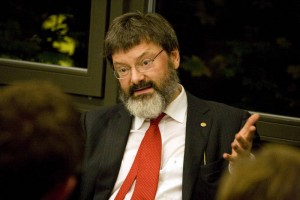
On the evening of October 27th ECLA was honored with a lecture by the highly-respected German scholar Heinrich Meier. Meier has written extensively on Carl Schmitt, a controversial political theorist whose work has received increasing attention in the past three decades.
In the lead-up to Meier’s lecture, Schmitt and his theories emerged as a topic of investigation, curiosity, and even anger among ECLA’s populace. This became clear at a special reading group discussing Schmitt’s The Concept of the Political, Leo Strauss’ notes on that book, and letters between the two edited and presented by Meier himself.
However, one of the central insights of the discussion was that, despite their very different historical positioning (Strauss, a Jewish academic, was forced to flee Nazi Germany, while Schmitt joined the Nazi party shortly after Hitler’s rise to power), Strauss’s reading of Schmitt fundamentally illuminates the central notion of the political.
The ambiguous alignment between the thought of Strauss and Schmitt, and furthermore their relationship during their lifetimes, informed the title of Meier’s lecture, “Carl Schmitt and Leo Strauss: Re-enacting the Confrontation of Political Philosophy and Political Theology.” Meier, who holds appointments at the University of Chicago’s Committee on Social Thought and Ludwig Maximilian University of Munich, is undoubtedly conscious of the irony in such a framing of the relationship.
After all, in The Concept of the Political Schmitt essentially defines the political as actions and motives that can be reduced to friend/enemy distinction. Much of Meier’s lecture emphasized the interaction and interest the two thinkers had with each other, including a compelling utterance from Schmitt that until the moment of his death, he would be interested in hearing views from or about Strauss. Schmitt and Strauss communicated through letters only until 1934, when the former acquired an official position within the Nazi bureaucratic apparatus.
Most of Meier’s lecture, however, avoided expounding either the historical context of the relationship or the specific doctrines concerning the political that each scholar developed. Rather, Meier’s focus was on the existential position of each thinker that becomes apparent through their scholarship. For Schmitt this position is ‘political theology’ and for Strauss it is ‘political philosophy’. Meier’s claim is that these two positions are radically opposed.
Meier stated that the political theologian constructs a “political theory that understands itself to be grounded in the obedience of faith.” He stressed that Schmitt was the first person to proclaim himself a political theologian after Augustine attacked the idea of political theology as self-interested in a worldly fashion.
Schmitt liberates the term, and Meier ultimately understands “political theology” to be Schmitt’s answer to the question, “How should I live?” The commandment of obedience to a sovereign God supposedly keeps an individual in accord with himself. When particular problems arise the political theologian considers that they cannot be solved by human reason but only by faith.
The enemy of the political theologian is the political philosopher. Meier believes that the way Strauss uses the term is substantially different from its being understood as a simple sub-discipline of philosophy. For Strauss “political philosophy” is the only way to make philosophy as a way of life viable.
If philosophy is truly a way of life then for any individual it is in confrontation with alternative ways of living. Insofar as philosophy must stop itself from falling victim to a greater authority that dictates how we live life, then it should be understood as political. Political philosophy is aware that philosophy is consistently engaged in overcoming adversaries, which take the form of objections or intellectual challenges.
Philosophy uses the tool of rational justification to make the objections as strong as possible and ultimately defeat them.
For Meier the political adds the element of self-knowledge and reflectivity to the identities of theologian and philosopher. When these two positions fully come into their own, however, they can only be radically opposed to each another.
Meier, who noted that he has been doing scholarship on Schmitt and Strauss for two decades, drew upon their relationship to make a larger statement not only about the opposition of philosophy and theology, but also assert that the greatest knowledge of one’s way of life comes through understanding an opposing view.
by Michael David Harris (AY’12, USA)
